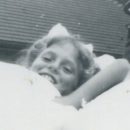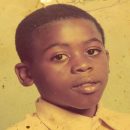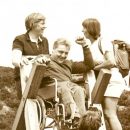Resistance
Ann Torode: Mind and body
Ann was born in 1943 in Dulwich, London. She was sent to a special primary school, then known as an 'educationally sub-normal' school until her mother won a battle to have her moved to her local mainstream primary school. From there Ann went on to a girls' grammar school and afterwards to university.
More from
Ann Torode
Here Ann talks about how she coped with prejudice as a young disabled child.
Transcript
If you realise you’re in a body, then you have to deal with the fact of the impairment and everything else. If you blank the whole thing out and you’re walking down the street and nobody can see you,nobody’s going to say anything to you.You’re not going to be teased, so and you’re not going to have to deal with it. So it’s a very bad, a very bad way to bring yourself up, as it were, but that’s what I did and I’m still battling with that now. My phrase was 'They can’t get me. They can’t get me, they can’t affect me and I can’t affect them'. So it was both because the other part of that, the pattern was, I think I thought that I hurt being people by being...
I think I thought I hurt my parents by being disabled and that carried on to, I was this kind of person who hurt people and disappointed people and I think that came from... (home life/everything around me) but I don’t know, maybe parents are in a… what can they do? It’s very hard, especially in the 40s, when the whole culture, we’d just had Hitler for god’s sake, where babies, they killed disabled people. Sweden still had laws about that, America did. I mean they all still do it now but in those days it was very, very, what’s the word, zeitgeist, wasn’t it?
I think the way I escaped my body was my mind and my mind was linked up completely with politics. You know what I mean? As I say, if I didn’t, if I hadn’t been brought up in that environment, I would have had to have faced my impairment and its consequences much more directly than I did. This body mind split thing is really important and it happens to disabled people and especially if you’re born, I think the patterns around being born with a disability are different from patterns around when, if it happens when you’re older. I think you tend to discount yourself and dismiss yourself far more. It became conscious for me because I did a lot of counselling and got involved in the women’s movement, which is primarily about controlling our bodies. Which is ironic, cos if you’ve got CP Cerebral Palsy, you don’t have a lot of control over your body physically. It’s very ironic, you know, I never even mentioned that when we were doing these consciousness-raising sessions about bodies.
A, I don’t have one and B, I have no control over it. Yeah.
Explore more
Explore stories by theme or view the timeline of significant events in education for disabled people
![How Was School? [logo]](https://howwasschool.allfie.org.uk/wp-content/themes/hws-base-theme/assets/img/allfie-logo-original.svg)



